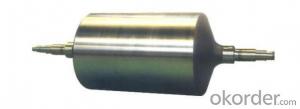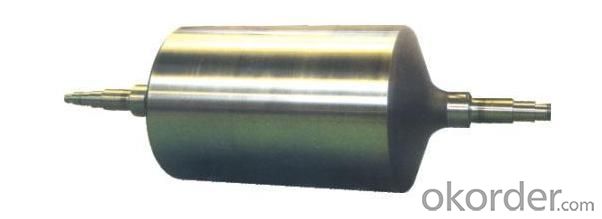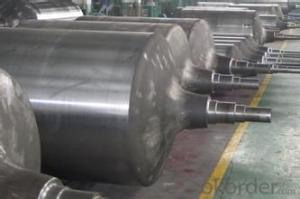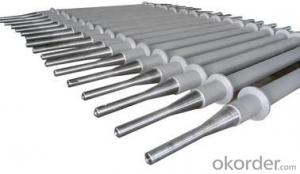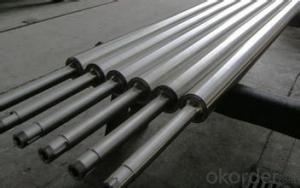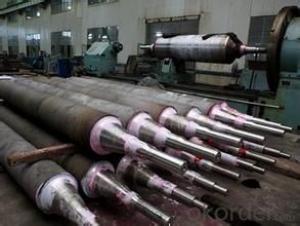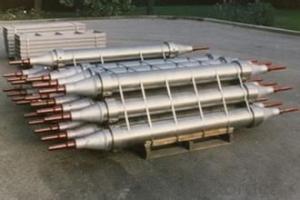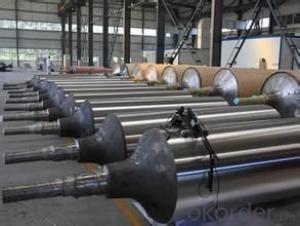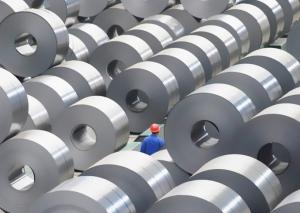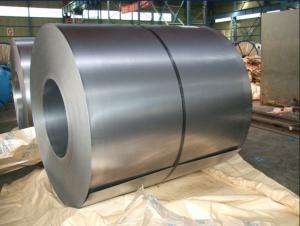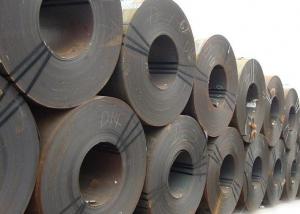In-furnace Support Roll
- Loading Port:
- Tianjin
- Payment Terms:
- TT OR LC
- Min Order Qty:
- 1000 PCS
- Supply Capability:
- 10000 PCS/month
OKorder Service Pledge
OKorder Financial Service
You Might Also Like
Quick Details
| Place of Origin: | Brand Name: | Model Number: | In-furnace support roll | ||
| Application: | machinery | Material: | Steel,9Cr2Mo, 86CrMoV7,60CrMo,VC9 | Dimensions: | 420*9870 |
| Type: | Forging Parts | Certification: | ISO9001 | Diameter: | 30-800mm |
Packaging & Delivery
| Packaging Detail: | wooden case |
| Delivery Detail: | 30-50 working days |
Specifications
1. High coefficient of friction
2. Non-marking roll surface
3. Long life
4.Cut resistance
In-furnace support roll
Rolls series:
--Backup rolls and work rolls for sheet and strip mills
--Breakdown rolls
--Section mill rolls and sleeves for long product mills
--Backup rolls and work rolls for plate mills.
Quality Standard:
Wear resistance, Damage tolerance, and Fatigue endurance.
Specification of Roll | Scope |
Diameter of Barrel | 400~3500mm |
Length of machining | ≤20,000mm |
Process | Forging, Casting |
Material | Alloy steel, Carbon steel, Iron, etc. (86CrMoV7, 9Cr2Mo,9Cr3Mo, 70Cr3Mo,MC3,MC5,SHSS...) |
Barrel hardness | Work roll: ≥ 95HSD, 90~96HSD, 70-90HSD |
Neck hardness | 30~50HSD, 50~65HSD, 75-90HSD |
Barrel hardness evenness | ≤3HSD |
Hardness depth of barrel(one side) | 12~18mm(2%Cr series), 18~35mm(3%Cr series), 20~40mm(5%Cr series) |
Chenmical Analysis
Clssification | Hardness | C | Si | Mn | Ni | Cr | Mo |
Chilled I | 60-70 | 3.0~3.5 | 0.25~0.5 | 0.3~0.8 | 0.5~1.0 | 0.4~1.0 | 0.2~0.6 |
Chilled II | 62-75 | 3.0~3.5 | 0.25~0.5 | 0.3~0.8 | 1.0~2.0 | 0.5~1.2 | 0.2~0.6 |
Chilled III | 65-80 | 3.0~3.5 | 0.25~0.5 | 0.3~0.8 | 2.0~3.0 | 0.6~1.5 | 0.2~0.6 |
Chilled IV | 70-85 | 3.0~3.5 | 0.25~0.5 | 0.3~0.8 | 3.0~4.5 | 0.6~1.5 | 0.2~0.6 |
Applications
--TMT Rolling Mills
--U-Section Mills
--Thin Flat Rolling
--Mills ICCI Intermediate Stand Rolls
--ICCI Finishing
--Stand Rolls Deep Section Mills
--Round Rolling Mills
--Wire Rod Rolling Mills
--T-Section Mills
--Narrow Strip Mills
- Q: What are the applications of steel angles?
- Steel angles have a wide range of applications in construction and manufacturing industries. Some common uses include providing structural support in buildings and bridges, reinforcing concrete structures, creating frameworks for machinery and equipment, as well as forming braces and brackets for various architectural and engineering projects.
- Q: How is steel different from iron?
- Steel is different from iron in that it is an alloy made by adding small amounts of carbon to iron, which gives it enhanced strength, hardness, and durability compared to pure iron. Steel also offers better resistance to corrosion and can be easily shaped and molded into various forms, making it a versatile material for construction, manufacturing, and other applications.
- Q: How is steel used in the agricultural industry?
- Steel is commonly used in the agricultural industry for various purposes such as constructing buildings, barns, and storage facilities, manufacturing agricultural equipment like tractors, plows, and harvesters, as well as fencing and irrigation systems. Its strength, durability, and resistance to corrosion make it an ideal material for these applications, ensuring the longevity and efficiency of agricultural operations.
- Q: What are the different types of steel forgings and their applications?
- There are several types of steel forgings, including open-die forgings, closed-die forgings, and seamless rolled ring forgings. Open-die forgings are created by heating a piece of steel and shaping it between two flat dies, allowing for larger and more complex shapes. They are commonly used for large components such as shafts, discs, and cylinders. Closed-die forgings involve compressing a piece of heated steel between two dies with a specific shape, resulting in highly precise and intricate parts. These forgings are commonly used in automotive, aerospace, and manufacturing industries for components like gears, connecting rods, and turbine blades. Seamless rolled ring forgings are produced by shaping a piece of heated steel into a ring-like structure using specialized rolling mills. These forgings are used in applications that require high strength and durability, such as bearings, gears, and flanges. Each type of steel forging has its own unique set of applications and benefits, allowing for the production of a wide range of components used in various industries.
- Q: How do steel products contribute to the agricultural and farming sector?
- Steel products contribute to the agricultural and farming sector in various ways. Firstly, steel is used to manufacture durable and strong equipment such as tractors, plows, and harvesters, which help increase efficiency and productivity on farms. Additionally, steel is utilized in building structures like barns, sheds, and storage facilities, providing a sturdy and long-lasting shelter for livestock and crops. Moreover, steel is essential for irrigation systems, fencing, and machinery parts, ensuring the smooth operation of agricultural activities. Overall, steel products play a crucial role in enhancing the effectiveness, safety, and sustainability of the agricultural and farming sector.
- Q: What are the different types of steel reinforcement used in construction?
- There are various types of steel reinforcement used in construction, including mild steel bars, deformed steel bars, welded wire mesh, and steel fibers.
- Q: How are steel products used in the automotive industry?
- Steel products are widely used in the automotive industry for various purposes, including the construction of car bodies, chassis, and engine components. Steel provides strength, durability, and crash resistance, ensuring the safety of passengers. It is also used for manufacturing components like suspension systems, exhaust systems, and various other parts due to its high tensile strength and resistance to corrosion.
- Q: What are the different types of heat treatments for steel?
- There are several different types of heat treatments for steel, including annealing, normalizing, quenching, tempering, and case hardening.
- Q: How can steel products be protected from corrosion?
- Steel products can be protected from corrosion through various methods such as applying protective coatings like paint or zinc, using galvanization or electroplating techniques, implementing cathodic protection, or utilizing corrosion inhibitors.
- Q: How is steel used in the production of renewable energy systems?
- Steel is commonly used in the production of renewable energy systems due to its durability, strength, and cost-effectiveness. It is used in the construction of wind turbines, solar panels, and hydroelectric power plants, providing structural support and ensuring their long-term reliability. Additionally, steel is used in the manufacturing of transmission towers and infrastructure for renewable energy systems, allowing for efficient distribution of clean energy to communities.
Send your message to us
In-furnace Support Roll
- Loading Port:
- Tianjin
- Payment Terms:
- TT OR LC
- Min Order Qty:
- 1000 PCS
- Supply Capability:
- 10000 PCS/month
OKorder Service Pledge
OKorder Financial Service
Similar products
Hot products
Hot Searches
Related keywords
